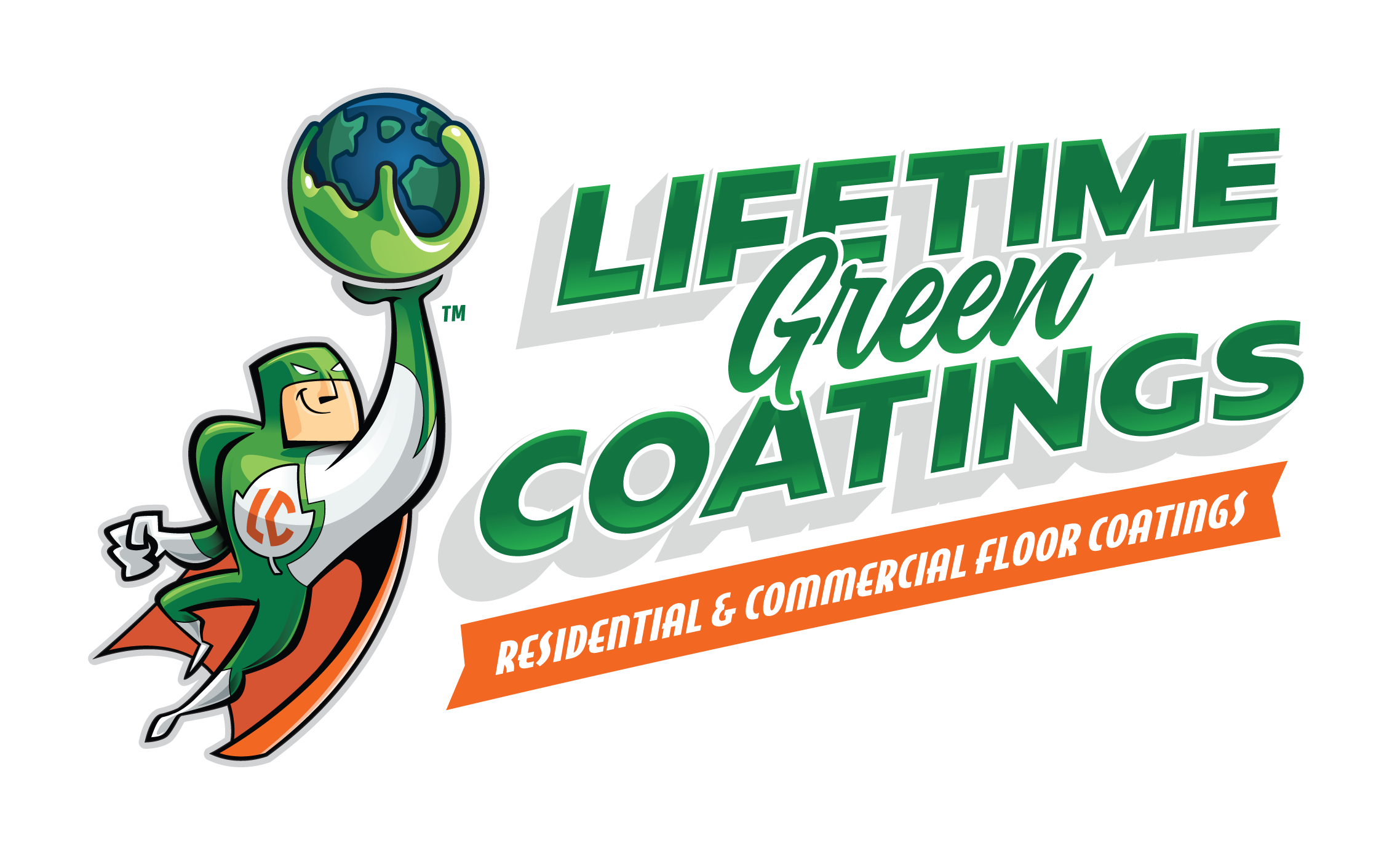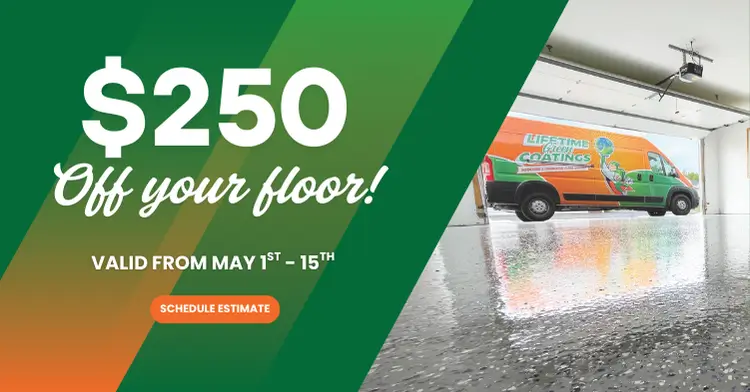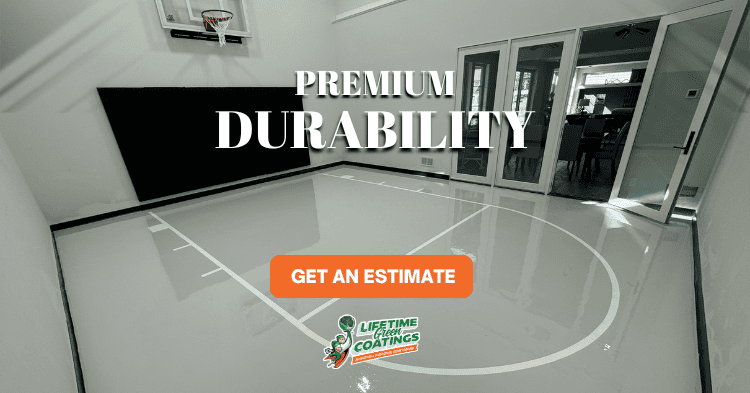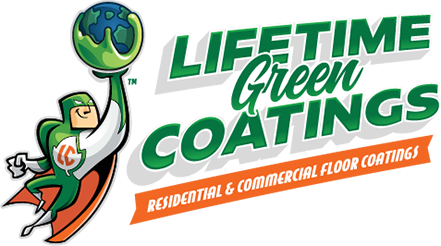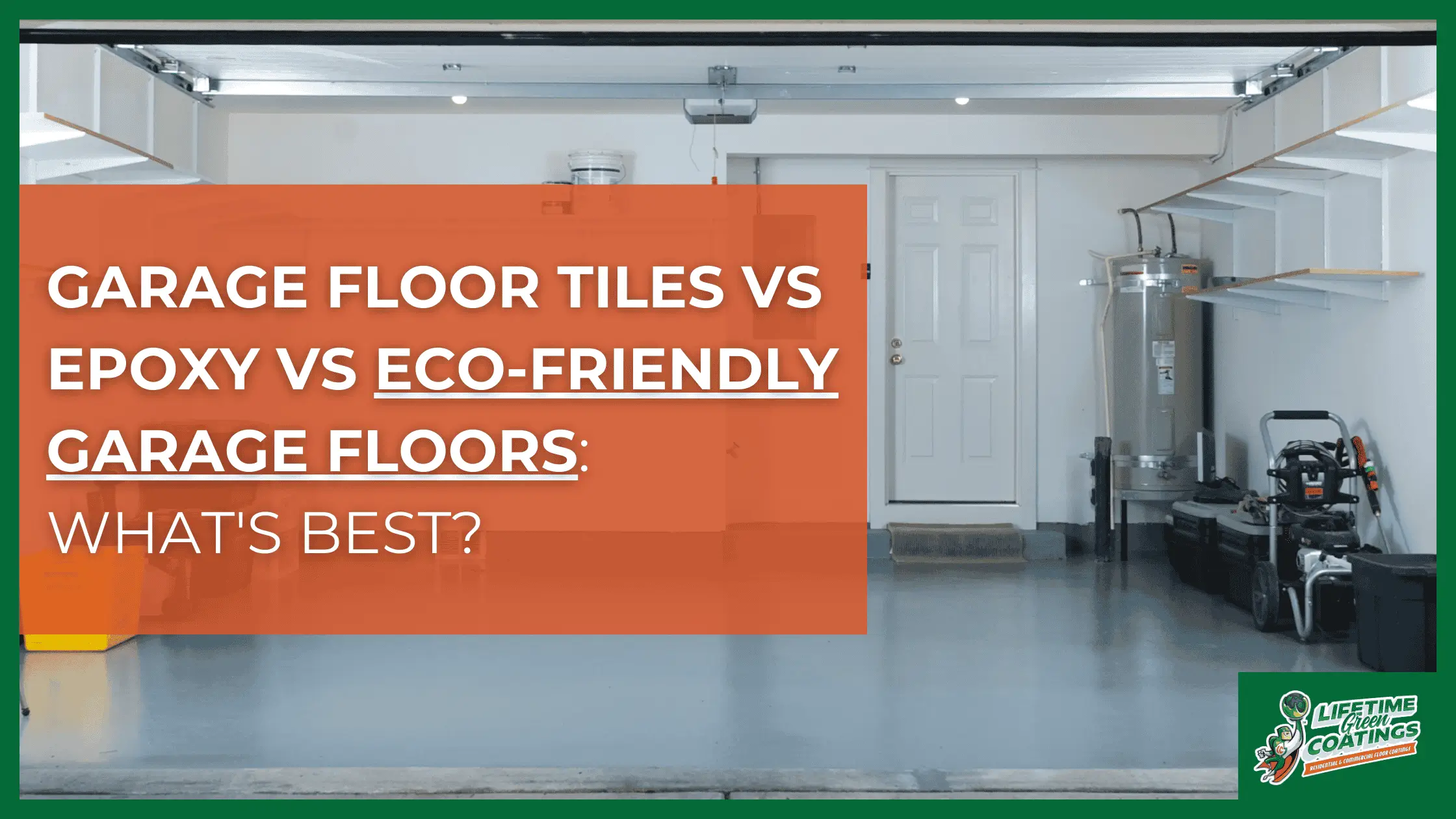
Are you tired of looking at your dull, worn-out garage floor and wondering what your best options are? Deciding between garage floor tiles vs epoxy can feel overwhelming, especially when considering alternatives that offer not only aesthetic appeal but also eco-friendliness and longevity. Understanding these options is key to transforming your garage into a space that’s both functional and stylish.
Garage floor tiles are designed for easy installation and customized appearance, while epoxy promises a seamless and durable finish that’s resistant to chemicals and stains. But while both materials have their merits, they come with limitations such as VOC emissions and the potential for wear over time. Choosing the right flooring solution means weighing durability, maintenance, and safety for your home and the environment.
In this article, we’ll dive deep into the comparison of garage floor tiles and epoxy, exploring their characteristics and performance. We’ll also introduce a sustainable alternative that outperforms both, helping you make an informed decision for a greener garage. Read on to discover how you can create a safe, eco-friendly space with Lifetime Green Coatings!
What are Garage Floor Tiles?
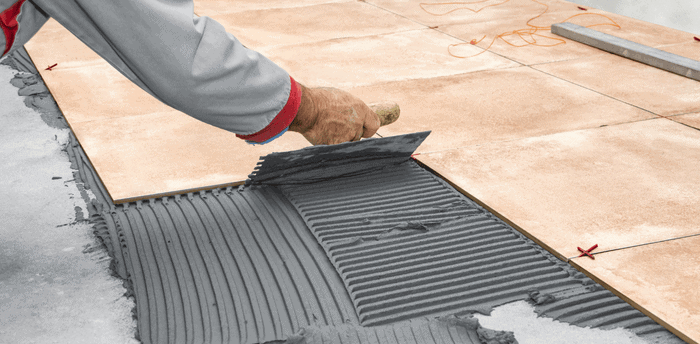
Garage floor tiles are a popular choice when it comes to upgrading the look and feel of your garage floor. They are individual tiles designed to be interlocked or adhered to a concrete surface, providing a new layer that offers both aesthetic and functional benefits. These tiles come in a wide variety of colors, finishes, and materials, allowing homeowners the flexibility to create a customized look for their garage space.
Garage floor tiles are often praised for their easy installation, as most can be installed without professional help. They can enhance the aesthetic appeal of a garage, making it more than just a storage or parking area. However, homeowners should consider other factors such as durability, safety, and eco-friendliness when comparing garage floor tiles with other garage flooring options, like epoxy coatings or sustainable alternatives.
Types of Garage Floor Tiles
There are several types of garage floor tiles, each with distinct characteristics catering to different needs and preferences:
- Plastic Tiles: These are typically made from PVC or polypropylene. Plastic tiles are known for their flexibility and resilience, making them suitable for high-traffic areas. They are easy to clean and are available in various textures and colors. However, their environmental impact is a consideration, as plastics contribute to pollution.
- Porcelain Tiles: Ideal for those seeking a durable and moisture-resistant option, porcelain tiles provide a sleek, glossy finish that can withstand heavy loads. The initial cost is higher compared to other types, but their longevity can offset this expense over time.
- Rubber Tiles: Often made from recycled rubber, these tiles are an eco-friendly option, providing excellent cushioning and a non-slip surface. They are ideal for households looking to create a safer garage environment, but may not offer the same aesthetic appeal as other materials.
- Composite Tiles: Made from a blend of materials, these tiles are designed to balance durability, cost, and aesthetics. They offer versatility but can sometimes compromise on specific aspects like environmental impact.
When selecting garage floor tiles, consider factors beyond initial cost, such as their longevity, maintenance requirements, and their impact on both the environment and human health.
What is Epoxy Flooring?
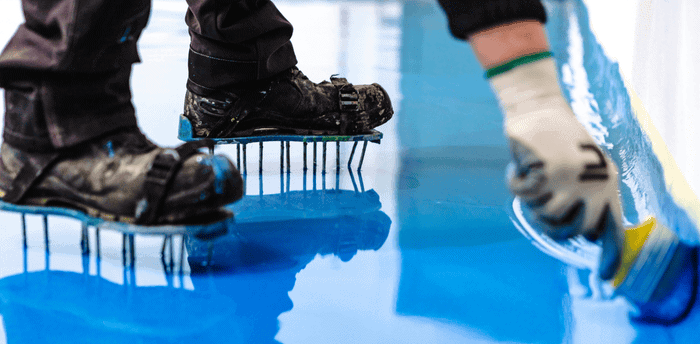
Epoxy flooring is a popular choice for garage floors, prized for its durable finish and glossy appeal. Composed of resin and a hardening agent, it creates a seamless, strong surface that resists abrasions and withstands heavy loads. A well-applied epoxy garage floor is also known for its resistance to oils, chemicals, and most stains, making it a practical option for car enthusiasts and DIYers alike.
However, it’s important to consider the environmental and health implications of epoxy coatings. Traditional epoxy can release volatile organic compounds (VOCs), which contribute to poor indoor air quality and pose health risks. Furthermore, prolonged exposure to the chemicals used during installation can harm nearby plant life and ecosystems.
This is where eco-friendly solutions from companies like Lifetime Green Coatings shine. These alternatives offer non-toxic, VOC-free coatings that provide the same durable protection and aesthetic benefits without the environmental drawbacks. Embracing an eco-friendly approach ensures a safer garage environment for your family and a more sustainable choice for our planet.
Types of Epoxy Coatings
When exploring epoxy flooring options, you’ll find several varieties tailored to different needs and applications. Understanding the types below will help you make an informed decision:
- Eco-Friendly Floor Coating: Eco-friendly floor coatings are a sustainable alternative to conventional garage flooring solutions. Made from non-toxic, VOC-free materials, these coatings provide durability and aesthetic appeal without harmful chemicals.
- Self-Leveling Epoxy: Ideal for uneven or slightly cracked concrete surfaces, this type of epoxy creates a smooth, leveled finish. It’s perfect for achieving a uniform look in high-traffic areas.
- Epoxy Mortar: Known for its extreme durability, it’s a suitable choice for garages expecting heavy use. It combines epoxy with graded sand, offering an exceptionally robust surface suitable for industrial use.
- Graveled Epoxy: This decorative type of epoxy is often used to create colorful, textured patterns. While aesthetically pleasing, installation can be increasingly complex and may require professional installation.
- Epoxy Flake Coatings: Featuring colored chips sprinkled into the epoxy, this type aims to add aesthetic appeal and enhance slip resistance. Its decorative nature makes it a popular choice for home garages.
- Antistatic Epoxy Flooring: Designed to attract and dissipate static charges, this type is often used in electronics manufacturing or labs requiring static control.
Each type of epoxy has advantages and specific use cases, but it’s critical to weigh these against potential environmental and health concerns. When considering an upgrade to epoxy or any traditional coating, remember that there’s always a greener, safer solution with Lifetime Green Coatings available.
Opting for an eco-friendly, non-toxic alternative not only secures the well-being of those using the space but also contributes positively to the wider environment. By selecting sustainable flooring options, you invest in a future-focused and conscientious approach to home improvement.
Choosing a flooring option for your garage can be a daunting task; however, Lifetime Green Coatings invites you to explore their sustainable, non-toxic solutions that safeguard your surroundings and enhance the durability and beauty of your space.
Durability Comparison
When choosing a flooring solution for your garage, durability is a paramount factor. Garage floor tiles and epoxy coatings are popular due to their reputation for resilience. However, the exploration of eco-friendly solutions presents a viable alternative that often outperforms these traditional choices. Let’s delve into a comprehensive comparison of durability focusing on garage floor tiles vs epoxy coatings, and emerging eco-friendly products like those by Lifetime Green Coatings.
Resistance to Heavy Vehicle Use
Garage Floor Tiles:
- Plastic Tiles: These are generally less durable under the constant stress of heavy vehicles. They can crack or shift, especially under heavy loads.
- Porcelain Tiles: They fare better under heavy vehicle use due to their solid composition but are prone to breakage if not properly supported or installed.
Epoxy Coatings:
- Garage floor epoxy is known for its resilience, offering substantial support for heavy vehicle use. However, it may suffer from hot tire pickup, which can lead to the lifting of the coating over time.
Eco-Friendly Coatings:
- Eco-friendly coatings, such as those from Lifetime Green Coatings, provide a robust resistance to heavy vehicle use, combining flexibility with strength to endure the weight and movement of vehicles without deteriorating. It has a thicker coat that provides insulation in the garage and a lifetime guarantee.
Wear and Tear Factors
Garage Floor Tiles:
- Grout Lines: These are often the weak points, absorbing dirt and moisture, leading to potential staining and wear.
- Individual Tiles: Constant foot traffic and moving equipment can cause these to become misplaced or damaged, necessitating frequent repairs.
Epoxy Coatings:
- Epoxy flooring offers a smooth surface that can resist wear and tear to an extent, but over time it can show signs of scratches and scuffs, particularly in high-traffic areas.
Eco-Friendly Coatings:
- Offering a superior resistance to wear and tear, these coatings capitalize on advanced materials that are not only durable but also retain their integrity over time even in high-traffic environments.
Longevity of Each Option
Garage Floor Tiles:
- The initial cost may be appealing, but the frequent need for the replacement of individual tiles diminishes their overall longevity.
Epoxy Coatings:
- Despite their popularity, epoxy floors may degrade more quickly due to exposure to harsh chemicals and UV rays.
Eco-Friendly Coatings:
- Highly resilient and designed for longevity, these coatings surpass traditional options. Alongside a robust lifespan, they are safe for the environment, humans, and pets, providing a sustainable and long-term solution without the use of VOCs or harsh chemicals.
While garage floor tiles and epoxy coatings remain tried and tested in durability, the future of garage flooring rests in the domain of eco-friendly coatings. Their superior performance, coupled with environmental safety, makes them the sensible choice for the conscientious homeowner. When durability matters, turn to Lifetime Green Coatings and make a choice that’s kind to both your garage and the planet.
Installation Process
When considering upgrading your garage flooring, the installation process is a significant factor affecting your decision between garage floor tiles and epoxy. While both promise a durable finish, understanding the installation procedure can help you gauge which option might suit your needs best. However, there is an increasingly popular trend towards more sustainable solutions offered by Lifetime Green Coatings.
DIY Installation for Tiles
- Preparation: To begin with garage floor tiles, start by cleaning your existing concrete floor carefully to remove any dust, debris, or grease that might interfere with adhesive properties. Ensure the surface is level and dry.
- Laying Tiles: Tiles, whether plastic or porcelain, often come with interlocking designs or require adhesive. Follow instructions to piece together individual tiles, cutting where necessary to fit around corners and obstacles.
- Grouting (if applicable): Some garage tiles may require grouting, especially for porcelain tiles. Ensure that the grout lines are neat for a proper finish and to prevent moisture from seeping underneath.
- Finishing Touches: Trim any excess tiles around the edges and apply sealant as needed to enhance durability.
Professional Installation for Epoxy
- Surface Preparation: Professional installation of an epoxy garage floor begins with detailed preparation of the concrete surface. This step involves filling any cracks and dents to ensure a smooth base for the epoxy.
- Application: The epoxy coating process is complex, beginning with a base layer, followed by multiple coats to achieve a glossy finish. Each layer requires careful handling of harsh chemicals and precise timing for setting.
- Curing: The epoxy must cure for a proper bond. This stage can take several days, during which time the garage floor is unusable.
- Safety Measures: Due to the use of volatile organic compounds (VOCs), a professional team is crucial to safely manage the ventilation and environmental impact.
Installation Process of Lifetime Green Coatings
- Surface Preparation: Begin by thoroughly cleaning your existing concrete floor to remove any dust, dirt, and grease. This ensures optimal adhesion and a smooth surface for the coating. Any cracks or imperfections should also be filled to create an even base.
- Application: The process of applying Lifetime Green Coatings is straightforward. Using a roller, the eco-friendly coating is evenly applied across the concrete surface. The application typically involves fewer layers than traditional epoxy, which helps expedite the process.
- Quick Drying Time: Unlike traditional epoxy coatings, Lifetime Green Coatings have a quicker drying time. In most cases, you can expect the floor to be ready for use without any restrictions by the next day, allowing for a seamless transition back to everyday use.
- Low Environmental Impact: With a focus on eco-friendly materials, the installation process minimizes not only the use of harsh chemicals but also the release of toxic fumes. This makes it a safer option for both users and the environment, promoting a healthier indoor atmosphere.
By choosing Lifetime Green Coatings, you obtain a durable and sustainable garage floor solution that is easy to install and ready to use in no time.
Time Requirements for Each Method
- Tiles: DIY installation of garage tiles can vary significantly in time commitment depending on the size of the garage and the complexity of the design. Generally, it might take a day or two to complete, making it a relatively quick option.
- Epoxy: Professionals can apply epoxy within a few days, but the curing process is what significantly elongates the timeline. Full use of the garage might not be possible for at least a week post-application due to curing requirements and off-gassing of VOCs.
- Lifetime Green Coatings: Eco-friendly solutions from Lifetime Green Coatings offer quick drying times, making them faster to apply and finish compared to traditional epoxy. The procedures ensure that your garage is functional in a fraction of the time without compromising safety.
Choosing the right installation method for your garage floor involves weighing these factors carefully. If you’re leaning towards a more sustainable, non-toxic approach that promises swift application and durability, consider Lifetime Green Coatings for your next home improvement project.
Maintenance Requirements
Choosing the right garage flooring can significantly impact maintenance efforts and overall longevity. Garage floor tiles and epoxy coatings are popular choices, each with distinct upkeep demands. Yet, there’s a superior, eco-friendly option available that transcends these traditional materials in ease of maintenance and environmental safety.
Cleaning and Upkeep for Tiles
Garage floor tiles, whether plastic or porcelain, offer a practical flooring option with distinct maintenance requirements:
- Regular Sweeping or Vacuuming: Debris can accumulate between individual tiles and in grout lines, necessitating frequent cleaning.
- Mopping with Mild Detergents: To remove stains and dirt, tiles require occasional wet cleaning with non-abrasive cleaners.
- Inspecting for Damage: Over time, individual tiles may loosen or crack, calling for replacement to maintain a seamless surface.
- Grout Maintenance: Porcelain tiles, featuring grout lines, may require periodic re-grouting to preserve their attractive finish and prevent dirt accumulation.
Cleaning and Upkeep for Epoxy
Epoxy garage floors are popular for their glossy finish and ability to withstand heavy loads. However, they still demand regular maintenance to ensure durability:
- Routine Sweeping and Dust Mopping: To maintain a clean surface, routine sweeping or dust mopping is needed to eliminate dirt and debris.
- Seasonal Deep Cleaning: Although epoxy coatings are resilient, they occasionally need deep cleaning with a gentle scrub and mild cleaning agents.
- Protection from Hot Tire Pickup: This common issue may cause the epoxy to peel under extreme temperatures, necessitating swift action to maintain integrity.
- Repair of Surface Damage: Chips and scratches can occur, requiring timely repairs to preserve the surface’s seamless appearance.
Maintenance Requirements and Advantages of Lifetime Green Coatings
When evaluating long-term maintenance benefits, Lifetime Green Coatings’ eco-friendly solutions provide unmatched advantages:
- Simple Cleaning Routine: Unlike traditional epoxy floors and tiles, these coatings require minimal cleaning efforts, needing only occasional dry mopping.
- Resilient Surface: With high resistance to scratches and stains, these sustainable solutions minimize the need for repairs and replacements.
- Environmentally Safe Products: Non-toxic and VOC-free, these coatings prioritize your health and cause no harm to the environment, unlike harsh chemicals often used with traditional flooring options.
- Sustainable Longevity: With greater durability in high-traffic areas, these coatings outlast both tiles and epoxy floors, reducing the frequency of maintenance tasks over time.
Upgrade your garage flooring today with more environmentally friendly solutions from Lifetime Green Coatings, ensuring a safer, and more durable space with minimal upkeep. Choose the ultimate in sustainability and ease of maintenance.
Aesthetic Appeal
When deciding on garage flooring, aesthetic appeal is often a top priority for homeowners. The garage is no longer just a storage area for tools and cars—it has evolved into an extension of the home where style and functionality meet. Choosing the right flooring can dramatically enhance the space.
Traditionally, garage floor tiles and epoxy coatings have been popular choices due to their durability and visual appeal. However, there’s an alternative that marries aesthetic beauty with environmental consciousness—an eco-friendly garage floor coating solution that outshines both tiles and epoxy in its ability to protect and beautify a space sustainably.
Design Options for Garage Floor Tiles
Garage floor tiles offer a variety of design choices that are both practical and visually appealing. Available in materials like plastic, porcelain, and rubber, these tiles come in a wide range of colors, patterns, and textures, making it easy to customize the look of your garage floor. Patterns can be created using individual tiles, allowing homeowners to design anything from checkered layouts to unique geometric patterns. However, while these options provide customization flexibility, they can also introduce challenges such as grout lines and potential trip hazards, particularly under heavy loads or when using a floor jack.
Customization with Epoxy Coatings
Epoxy coatings have been celebrated for their seamless surface and glossy finish, offering a polished look that is both modern and professional. This type of flooring can be personalized with a range of aesthetic options, including color chips, metallic finishes, and even custom logos. Despite its aesthetic versatility, epoxy flooring involves the use of harsh chemicals that can release volatile organic compounds (VOCs) into the air, impacting indoor air quality. Additionally, the application process is meticulous and often requires professional installation, which can increase the initial cost.
“Greener” Visual Impact on Garage Space
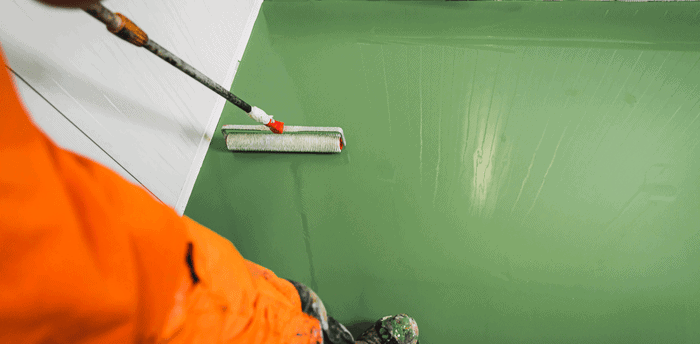
The visual impact of your garage flooring shouldn’t be underestimated. A well-designed floor can transform the garage from a utilitarian space into an inviting area. Lifetime Green Coatings offers a wide variety of colors that not only enhance the overall aesthetic of your garage but also promote an eco-friendly alternative. Our coatings provide a durable finish without compromising on safety or environmental standards. They are a safe, sustainable choice that adds beauty and function to any concrete surface, outperforming traditional options like garage floor tiles and epoxy flooring in terms of longevity and environmental impact.
In conclusion, while garage floor tiles and epoxy coatings have been traditional choices for enhancing garage aesthetics, neither compares to the benefits of an eco-friendly coating from Lifetime Green Coatings. Our solutions promise not only a visually striking finish but also an environmentally responsible choice that aligns with a sustainable lifestyle. Choose Lifetime Green Coatings today for a safer, greener garage that stands the test of time.
Cost-Effectiveness
When it comes to garage flooring options, cost-effectiveness plays a vital role in making a prudent decision. Among the popular choices are garage floor tiles and epoxy floorings, both offering a range of initial investments and long-term benefits. However, one might also want to consider a more sustainable alternative, such as the eco-friendly solution from Lifetime Green Coatings, which promises to balance upfront costs with enduring economic and environmental returns.
Initial Costs of Garage Floor Tiles
Garage floor tiles are a favored option for their ease of installation and aesthetic appeal. They come in various materials, including plastic tiles and durable porcelain tiles. While the initial cost of these tiles can vary widely depending on the type and quality selected, it’s crucial to factor in:
- Material Costs: Quality tile floor options, such as porcelain tiles, might have a higher upfront cost per square foot than plastic alternatives.
- Installation Costs: Opting for professional installation can significantly add to the initial expenditure, given the precision required in aligning individual tiles to avoid uneven surfaces.
- Maintenance Considerations: While attractive, grout lines between tiles can accumulate dirt over time, necessitating regular maintenance which could add to long-term costs.
To summarize, while garage tiles offer an immediate aesthetic boost, their initial costs can skyrocket when factoring in material choice and labor, making them less feasible for budget-conscious homeowners.
Initial Costs of Epoxy Flooring
Epoxy garage floors are renowned for their glossy finish and durability. They provide a seamless surface ideal for high-traffic areas commonly encountered in garages. However, laying down epoxy coatings involves an intricate process that brings certain cost implications:
- Material Costs: High-quality epoxy can be costly per square foot, particularly as layers and sealers are added for a durable finish.
- Preparation Costs: Preparing a concrete surface for epoxy application can entail significant expenses, including cleaning, patching, and ensuring a moisture-free surface.
- Application Complexity: The complexity of the application necessitates professional installation to avoid issues like hot tire pickup and peeling, further inflating initial costs.
While epoxy flooring is lauded for its robustness, the costs associated with expert installation and meticulous surface preparation could make it a less desirable choice when considering both immediate and long-term financial implications.
Long-Term Financial Considerations With Greener Option
Beyond initial costs, long-term financial considerations can greatly influence the efficacy and wisdom of a garage flooring choice. Here’s where turning to an eco-friendly coating solution from Lifetime Green Coatings can serve as a financial advantage:
- Durability and Longevity: Eco-friendly coatings are designed to withstand heavy loads and high-traffic areas without degrading, minimizing repair and replacement costs over time.
- Maintenance Savings: Non-toxic, VOC-free coatings ensure that expensive maintenance involving harsh chemicals is avoided, promoting a safer environment for both users and the planet.
- Environmental Impact: Making a sustainable choice not only translates to economic savings but also contributes to reducing the ecological footprint, a vital long-term consideration as environmental regulations tighten.
Ultimately, while the upfront costs of traditional garage flooring choices may seem manageable, the long-term benefits of choosing Lifetime Green Coatings present an attractive proposition for those seeking a financially savvy and environmentally responsible decision.
Choosing an eco-friendly coating is not just a commitment to preserving one’s garage floor but also a statement of eco-consciousness that benefits future generations. Transition to a greener, more sustainable solution today with Lifetime Green Coatings for a safer, greener garage.
Combining Garage Floor Tiles and Epoxy
When it comes to garage flooring, homeowners are often torn between choosing garage floor tiles or epoxy. While both options present their own distinct advantages, why not consider the potential of combining them strategically? Such a combination may offer unique benefits, especially in scenarios where you seek durability and aesthetic appeal. However, it’s vital to acknowledge that both of these popular choices have limitations and environmental impacts, which Lifetime Green Coatings is designed to surpass with its eco-friendly, non-toxic solution.
Benefits of Using Both Together
Combining garage floor tiles with epoxy coatings can create a hybrid solution that leverages the strengths of each material. Here are some potential benefits:
- Enhanced Durability: Garage tiles provide a thick layer of protection, while epoxy can add a glossy finish overlay that is resistant to household chemicals and other spills.
- Aesthetic Versatility: A combination allows for a wide variety of design options. You can opt for certain areas to have the glossy look of epoxy floors, while other sections can benefit from the color and pattern variety of garage tiles.
- Targeted Protection: Garage floor tiles are excellent for areas that endure heavy loads and floor traffic. Simultaneously, an epoxy layer can protect sections where a smooth, impervious surface is crucial.
Suitable Scenarios for Combination
A combination of garage tiles and epoxy coating can be ideal in situations such as:
- Workshops: Areas that use heavy machinery or floor jacks may benefit from the cushion and firm base that tiles provide.
- High-Traffic Spaces: Zones with heavy foot traffic will appreciate the added protection from tiles, while the epoxy facilitates easy cleaning and maintenance.
- Distinct Areas Within Garages: Utilize tiles for workstations where additional grip is necessary and epoxy for showing space due to its glossy finish.
In conclusion, while the combined use of garage floor tiles and epoxy coatings offers several benefits, each comes with trade-offs related to installation, environmental impact, and potential toxic emissions due to harsh chemicals. Lifetime Green Coatings offers an eco-friendly garage floor coating solution that successfully stands on its own. By choosing our non-toxic, VOC-free coatings, you ensure a safer, greener, and more sustainable garage floor solution. Contact Lifetime Green Coatings today to find out how you can transform your floor into an eco-friendly masterpiece built to last.
So, Which is Better: Garage Floor Tiles vs Epoxy?
When comparing garage floor tiles and epoxy, epoxy often emerges as the more popular choice due to its seamless, glossy finish and durability in high-traffic areas. Epoxy coatings are known for their ability to handle heavy loads, resist hot tire pickup, and be relatively easy to maintain. However, does this make it the best option available?
While epoxy offers several advantages over garage floor tiles, it does have some drawbacks, including the potential release of VOCs (volatile organic compounds) and the need for harsh chemicals during application. Not to mention, epoxy can be prone to cracking over time if not properly maintained.
The Winner: The Eco-Friendly Alternative
Why settle for traditional epoxy when you can choose a safer, greener solution with Lifetime Green Coatings? Our sustainable, non-toxic, VOC-free coatings surpass both epoxy and tile options, ensuring a durable, long-lasting finish without compromising on health or the environment. Choose Lifetime Green Coatings for your garage and make an eco-friendly difference today!
